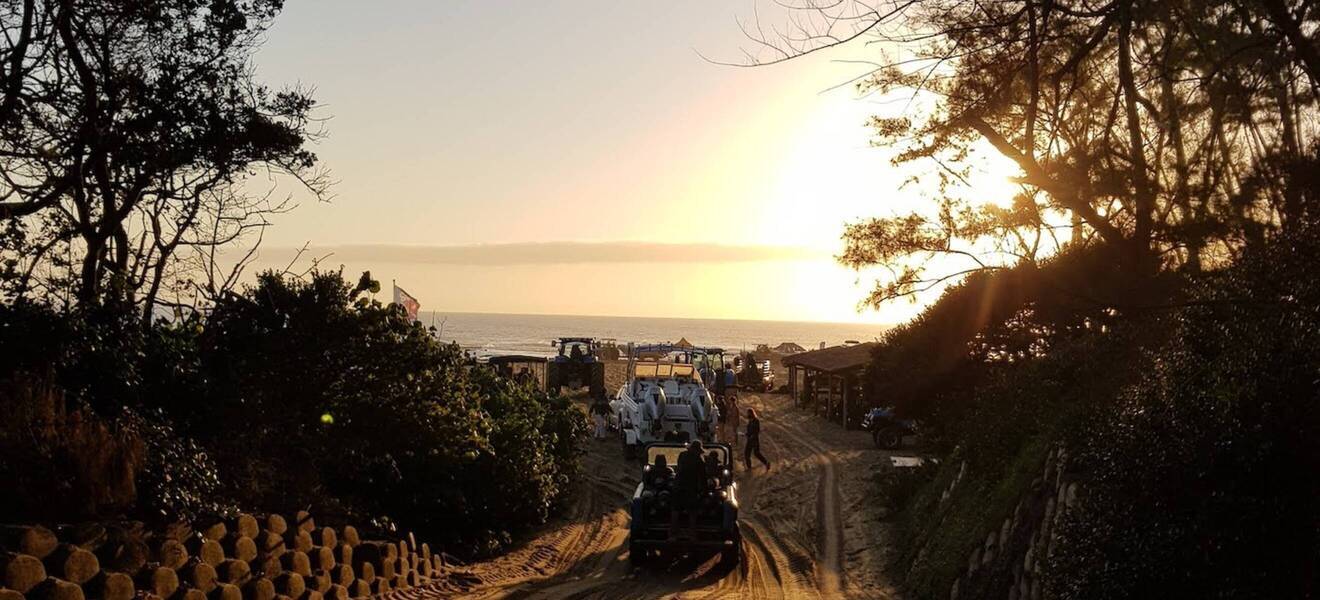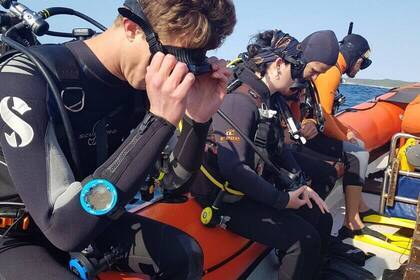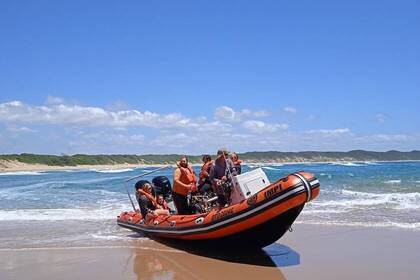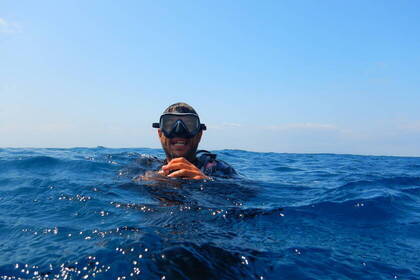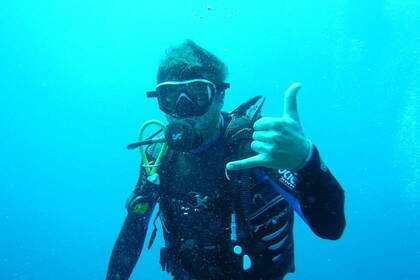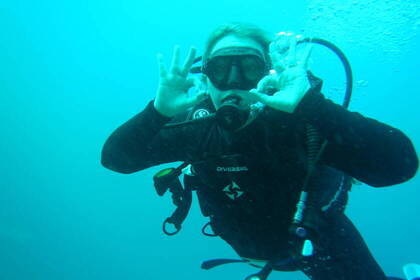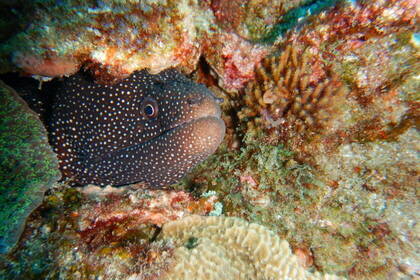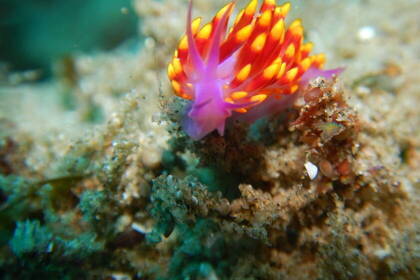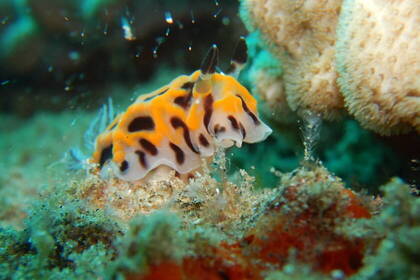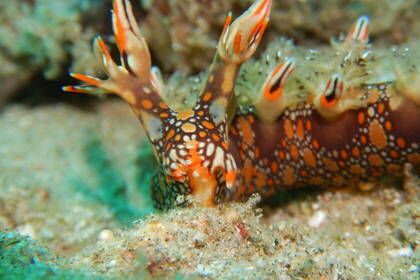Volunteering in marine conservation in KwaZulu-Natal Province
- High learning value
- Work outdoors
- Tours included
Immerse yourself in an exciting adventure in South Africa and experience the breathtaking beauty of the marine fauna up close! Become part of a volunteer project dedicated to protecting and preserving a unique ecosystem. You will observe and photograph fascinating nudibranchs and thus actively contribute to monitoring and preserving the reef. If that sounds like you, then head to the KwaZulu-Natal province!
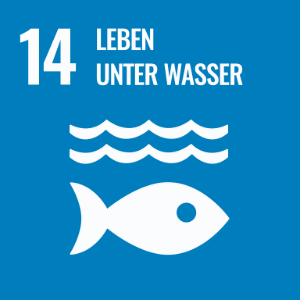
Conserve and sustainably use oceans, seas and marine resources for sustainable development.
What's the matter?
The location in the KwaZulu-Natal province of South Africa was founded in 2018 after the two founders had this dream in their heads on a sailing trip. The volunteers can support the team on site so that research can progress and the database can be expanded.
Due to the low population in the town, they have little chance of achieving what they really want without the help of volunteers. Observing nudibranchs can reveal a lot about the health of the reef, the quality of the water and the effects of climate change.
The aim of the project is to ensure a sustainable future for marine life and the underwater landscape. The aim is to give you a meaningful travel experience, educate you about the fascinating and complex world of the sea and learn how to treat oceans and reefs respectfully.
Your tasks as a volunteer
You can help out in the project five days a week. You will be driven to the beach and from there you will go on a boat from where you will start diving. While diving, your tasks will be to take photos of slugs for later identification. After your dives, you go back to camp, where you enter your finds into the database. On every dive you will be accompanied by a scientific divemaster who will guide you and teach you how to use the cameras.
There are two types of daily routines you face. Sometimes you do two dives a day and sometimes you only do one. If there are two dives, your day will look like this:
You will be picked up by car at 6:30 a.m. and you will drive to the beach with your equipment and then by boat to your diving site, where you will dive and take photos for about an hour and a half. Then you drive back to the beach to change your equipment and then go back on the boat and into the water. Once you're back on land, you go back to the site and you can have lunch. After lunch we get to the theory. You enter the data you found and then there is a course. You have free time from 16:00 p.m.
If there is only one dive per day, it starts later and looks like this:
You will be picked up from your accommodation at 9:30 a.m. and you will drive to the beach as a group. The journey on the water and your dive starts at 10:30 a.m. At 12:00 p.m. we go back to the site and have lunch. The rest of the day looks exactly the same as the other: you enter your photos into the database and there is a course. From 16:00 p.m. you have free time again.
Accommodation Catering
Volunteer House in the KwaZulu-Natal Province
The Volunteer House consists of two buildings. The main house has three rooms and can accommodate a total of six people. There is a living room, an open and fully equipped kitchen, a shared bathroom with shower, a covered terrace and a garden.
The smaller house has two bedrooms and can accommodate four people. There is a small lounge, a kitchenette, a shared bathroom with a shower and a garden. The rooms are always separated by gender, but the bathrooms are not. A cleaning lady comes once a week to clean the houses.
Fans and mosquito nets are provided for summer, while blankets are provided in winter. There are restaurants and bars nearby where you can eat. There are also pool tables as well as TVs and Wi-Fi, but not in the accommodation.
It's safe to walk around the city during the day, but we advise against walking alone at night as the risk of theft is higher. It's safer in a group at night and nothing should happen to you.
The scientific diving instructor lives on the property and the company's co-owners, Marius and Jo, take care of the daily transport, the excursions, the database and the lectures.
Location
KwaZulu-Natal Province
The project is located in the north-east of South Africa, more precisely in the KwaZulu-Natal province. The largest city in the province is Durban, home to around two million people. The region is known for its strong tourism, which is characterized by the beautiful and flat coastline. Inland, the terrain becomes hillier and there are two mountain ranges: the Drakensberg in the west with a height of 3000 m and the Lebombo Mountains in the north.
In the coastal region, which was once covered by tropical forests, sugar cane and tropical fruits are now grown. Durban is also a major industrial and port city with the largest port in Africa. Sugar processing is the most important industry in the region and is the main economic base in KwaZulu-Natal, accounting for over half of the income and jobs.
If you are more interested in flora and fauna, you will also get your money's worth here. There are many nature reserves and several national parks in the KwaZulu-Natal province. For example the iSimangaliso Wetland Park. This is a UNESCO World Heritage Site and one of the largest wetlands in South Africa. It stretches along the coast and covers an area of around 328.000 hectares. The iSimangaliso Wetland Park is not only a paradise for animal and plant lovers, but also an important place for the protection of endangered species.
So if you like varied nature and enjoy trying new things, then you're in the perfect place here!
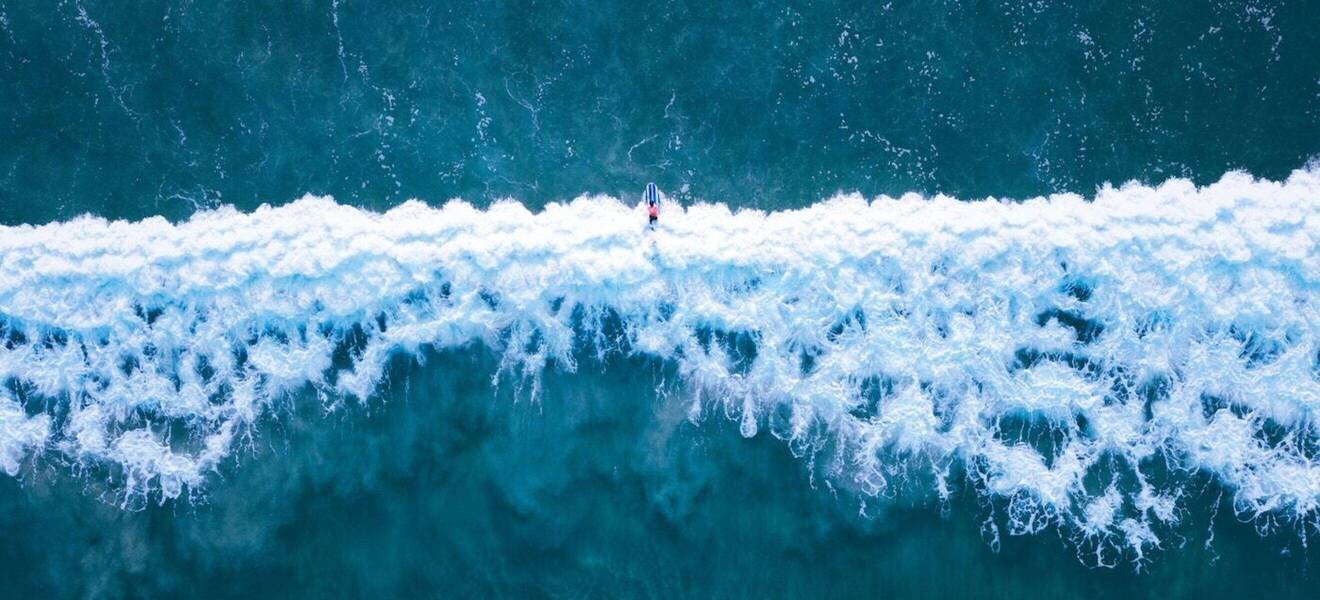
Your free time in the KwaZulu-Natal province
In your free time you can either go to bars, cafes or walk to small shops. The nearest larger city is 20 minutes away by car. The team leaders are also happy to drive you, as the use of public transport is not recommended. The project also offers many trips or excursions that you can take part in. You often watch sunsets together or do traditional African barbecues (braai). Surfing or safaris could also be on your agenda.
If you prefer to explore nature in your free time, this is also possible as there are many national parks and mountains in the region.
And if you haven't had enough of the water while working on the project, Durban also offers excellent opportunities for surfing, kite surfing and bodyboarding. Safety is a top priority as the beaches are protected with shark nets.
On-site procedure
Arrival in Durban
Important in advance: Please do not arrive at the airport after 14 p.m. as you still have a long drive ahead of you.
After arriving at Durban Airport, you will be taken to your accommodation by a team member. The journey takes about five hours. If this journey is too long for you, you can also fly to Richards Bay Airport, then the journey only takes two hours. However, fewer airlines fly to this airport. When you arrive at your accommodation you will be welcomed by the team and there will be a traditional African barbecue in the evening called Braai and you can get to know each other.
Orientation program in Durban
The orientation program takes place on the first day after your arrival. It takes around 30-40 minutes and takes place in your accommodation. During the introduction, the expectations for the project are explained, the daily and weekly schedule is discussed, and safety instructions are explained. You will also receive advice and suggestions for exploring the area.
If you don't have any diving experience yet, you can get your PADI Open Water qualification in the first week of the project. If you already have qualified diving experience, you can also take part in a refresher course.
Your first day in the project
You have the opportunity to join the project on the first or second day after your arrival. You will receive an orientation, tour the place, do some shopping and take part in a swimming session in the pool.
Pricing
-
2 weeks of participationbase fee€ 2.690, -
-
up to 10 weeks respectivelyextension week€ 840, - / week
included
Services
Before departure
- Individual advice and support from our trained RGV team in Munich
- Organization including placement in the project and coordination of your stay on site
- Assistance with preparation: visa, health care, travel insurance, etc.
- Non-binding flight advice
- Travel ABC with packing list for your travel preparation
- RGV t-shirt
On site
- Orientation program with the team on site
- Support and guidance from the on-site team
- RGV 24h emergency number
- Project t-shirt to wear during on-site activities
- Airport transfer (Richards Bay Airport) on the agreed arrival and departure day
- Accommodation in Volunteer House
- Daily drive to the project
- Catering: Provision of food
After return
- Participation confirmation of your voluntary commitment
- Reflection course on your experiences abroad
- Evaluation sheet and optional feedback discussion
not included
Services
- Round trip
- Private expenses on site
- Excursions with microlight flights
- Travel and cancellation insurance
- Visa and Vaccinations
- All nights outside your agreed accommodation
- Public transport and extra transfers
Individual
Recommended additional offers
& must-haves
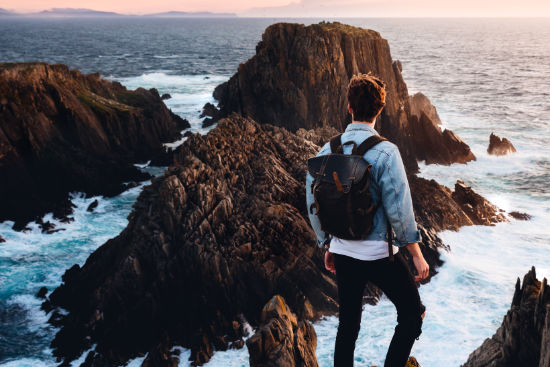
Would you prefer to stay in a single room? Are you vegan or do you have special requests for food? Or do you want to do some cool trips with other volunteers in your free time and explore the country?
With us, you benefit from a variety of optional additional services that you can add individually to your booking, depending on your preferences.
Cheap flights with our flight partner thanks to volunteer rates.
Would you like to receive a cheap flight offer for your stay abroad that is perfectly tailored to you? After you have successfully registered, you can have a non-binding offer created.
The excellent rates for volunteers, students and young people are a great advantage. Arrival times and flight time changes can also be sent directly to RGV upon request, so that our RGV teams in the destination countries are always informed about your arrival times.
These special tariffs give you special added value:
- maximum flexibility for rebookings and cancellations
- generous baggage allowance
- Additional discounts on one-way flights: The new volunteer tariffs include attractive discounts to reduce your financial burden on one-way flights (e.g. for stopovers, project or country combinations).
Benefit from the 4 in 1 ERGO travel insurance.
You can easily book the long-term travel protection of ERGO Reiseversicherung after you have registered. You will receive the links to this automatically after a successful registration.
The following building blocks are included:
- Health Insurance
- Comfort protection: accident, liability and interruption insurance
- Travel insurance
-
Two tools to get you started on your personal developmentPersonal development introductory courseFree of charge
KwaZulu-Natal Province
Team
site
Joanne is the co-founder of the operation center in South Africa. She is a zoologist and is currently responsible for the organization and logistics of the project. She leads all excursions and holds the courses.
Marius is the second co-founder and shares all tasks with Joanne. He also takes care of the logistics and organization of the project, drives the volunteers to the beach in the morning and also gives lectures. In addition, Marius is also a PADI instructor and has been diving in the region since 2017. So he has a lot of knowledge and experience when it comes to diving and the reef.
The third contact person is Nicholas. He is a scientific divemaster. He accompanies you on all dives and helps collect the photos. Nic completed his Divemaster internship in 2022 and is now supporting the volunteers as a mentor.
Lisa is also on the team. She is a marine biologist and helps with giving lectures, maintaining the databases and the social media account.
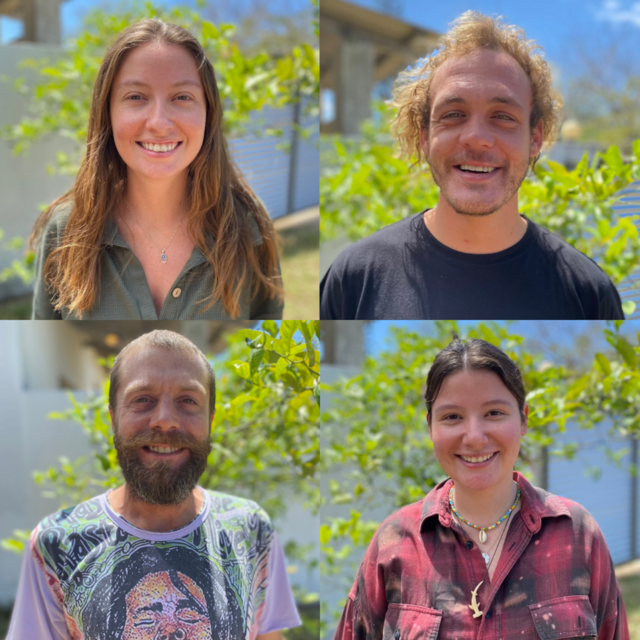
RGV
FAQ
to the project
How far in advance do I have to register?
Ideally your registration takes place at least 3-6 months before the desired departure date, But also short-term registrations are up 1-2 months before the planned departure is possible.
But it could be that your dream project is already booked. In this case we will try together to find a suitable alternative for you.
Can I travel with a friend or in a group?
Yes! On request we enable a double room if you for two with a friend or a friend, or an apartment or other suitable accommodation for groups.
We are very happy to enable our participants to go on a project and share accommodation with friends. Shared accommodation is usually possible both in the volunteer house and with the host family, although the room in the volunteer house may also be shared with other participants. In some locations there is also the option of sharing an apartment.
When registering, please always mention the person(s) traveling with you!
Can I combine projects?
Yes! You can combine projects at one location, at different locations, but also in different countries. It is also possible to combine a project with a trip. You can specify your desired combination directly when registering.
Combination options at a glance:
- Combine programs in one country
- Combine programs across countries
- Combine a program with a language course
- Combine a program with ours Adventure & Trips
There are a few things Project combinations to note: The minimum length of stay per project must be observed and you may incur additional costs for country combinations, for example for an intermediate flight.
What are the project fees used for?
Although we are a non-profit organization, there are costs associated with volunteering abroad. Find out here, why volunteering requires money and what your project fee is used for.
What visa do I need for South Africa?
You can apply for a tourist visa for South Africa when you arrive at the airport. This is valid for 90 days.
What language skills do I need for the project in South Africa?
You definitely need good English skills for the project. An Afrikaans course is also recommended.
What vaccinations/ health precautions do I need?
If you are traveling from a yellow fever area, you need a yellow fever vaccination. Otherwise there are no compulsory vaccinations.
We generally recommend a consultation in a practice for travel and tropical medicine.
You can get general information about recommended health care and vaccinations online Center for Travel Medicine as well as on the side of Foreign Office.
What differences are there depending on the season?
There are generally no differences in volunteer work, but the marine life at the site varies at different times of the year. The turtles nest and hatch in the South African summer months. The nesting season usually lasts from November to the end of February and the hatching season from mid-January to the end of April. In the winter months (June to August) the humpback whales migrate along the coast. Finally, between December and March, the sharks come to breed on the reefs.
What are the requirements for the project?
There are no special requirements for the project. However, you should have interest and passion for the sea and its inhabitants. If you already have diving experience, this is also an advantage, but not a must. But if you don't have any diving experience yet, you can take part in a course in the first week. If you already have experience, but it's been a while, you can also take a one-day refresher course so that you feel confident in the ocean later.
What do I have to consider as an LGBTQ person?
Please be aware that homosexual acts are considered undesirable in many countries in Africa, Asia and Latin America and are even punishable by law in some places. In general, people who are identified as queer are often exposed to hostility.
For example, get information from Foreign Office about the exact regulations in your destination country.
Ready to get involved as a volunteer in South Africa? Start your adventure abroad with Rainbow Garden Village!
Rainbow Garden Village has been offering volunteer work and internships abroad since 1999. What started as a small student initiative in Ghana has now grown into an organization with over 250 projects around the world.
You can be sure that your work as a volunteer will be an unforgettable experience. Bring your commitment and your knowledge to do good locally - and at the same time benefit from the unique experiences that will promote your personal development.
Become part of our RGV community!
We look forward to you.
RGV
Your way
to the volunteer
1
Choose your volunteer project and register online.
2
We will review your application and confirm your participation.
3
Prepare for your assignment online or in our preparatory seminar in Munich.
4
Here we go! During your volunteer work, we will support you at any time with our on-site team.
More projects you too might be interested
Are you not sure yet? Think about whether a spontaneous assignment as a volunteer abroad is the right choice for you or whether you would like to Voluntary social year (FSJ) abroad want to decide.
With RGV you achieve flexible volunteer work in different countries worldwide. Maybe there is one too Internship abroad the ideal choice for you to gain valuable experience abroad.
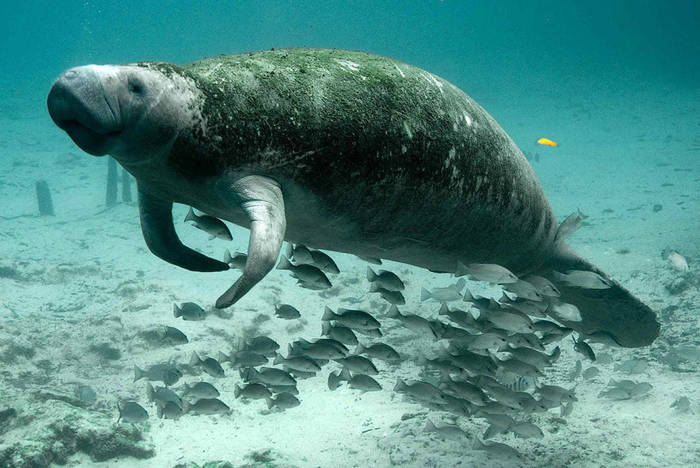

Sri Lanka | turtles
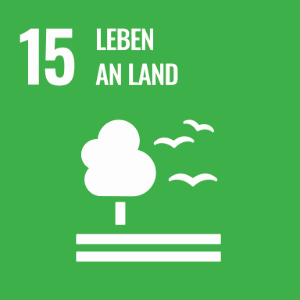
South Africa | wildlife
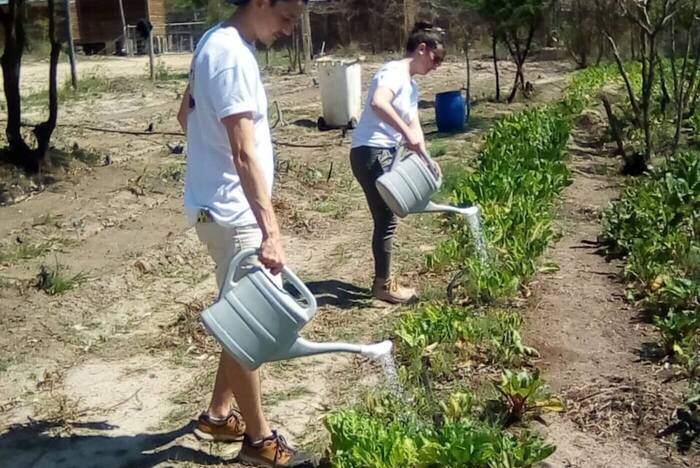

South Africa | environmental Protection

